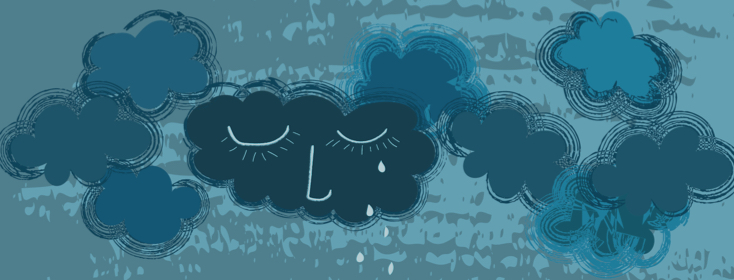Can Our Relationships Survive the Tide of Our Invisible Illness?
Sometimes the feelings and fears of abandonment, anger or self-loathing are so palpable that it is hard to breathe. The breath is literally pushed from my lungs as I fear being alone or unimportant. Friends, partners, colleagues, even strangers. No one is immune.
Unfortunately, these types of emotions, fears and misconceptions come hand-in-hand when you suffer from an invisible illness, specifically when a combination of physical and mental disorders are prevalent.
The perfect storm
I live my life with several "invisible" illnesses. I use quotations because, as many of us have said before, these illnesses are not truly invisible. My tears are visible. The limp I'm sporting today is visible. The bloating in my belly is visible... but I digress.
My IBS is simply one of many; and it is often exacerbated by my various food allergies and fibromyalgia. The cherry on top of this ice cream sundae is my mental health. I've written articles about these before so I will not spend time describing them; however, I will address the fact that mental state and physical illness combine to create the most perfect of storms.
When a physical disorder is flaring I can often manage. When a severe mood swing emerges it isn't always debilitating. But when these conditions meet, or rather collide, the clouds roll in. The rain begins, and before I know it I have a hurricane on my hands.
When the tides turn upon our relationships
As you can imagine, these monsoons of pain and emotion don't simply affect me; they take a toll on my relationships, as well. This is especially true for me. My Borderline Personality Disorder is almost always intertwined with my relationships. Fears of abandonment, real or imagined, are so prevalent, so controlling and overwhelming, that sometimes the smallest event can trigger a response. This domino effect completely dismantles any and all defenses previously created. And as this tsunami hits, the walls come crashing down.
She didn't smile when I looked at her. I can't wear the outfit I wanted because I feel bloated and cramped. His tone changed when he spoke to me. My partner must think I'm crazy. No one will want to talk to me if I can't be happy.
The crash of thoughts, fears, and feelings cannot be tamed by explanation. In fact, once initiated, even if the truth is thrust in your face, you are more often than not stuck in this intense storm of emotions. You are hatred. You are self-loathing. You are your worst fears and nightmares; you're the clingy girlfriend, the rude coworker that everyone avoids, the overbearing and controlling friend, the annoying girl that never stops complaining. Worse? You're aware of it.
When the storm is on the horizon
Perhaps one of the most frustrating things about mental health and invisible illnesses is their lucidity. You're often very aware of yourself, your actions, and even your feelings. But awareness is not control.
When the perfect storm hits you are no longer yourself, but you aren't completely blinded. You have become your astral self, flying above your body, unable to control what you say or do in the next few moments: you hear yourself accusing your partner of not caring; you see yourself sob uncontrollably; you watch as you alienate yourself and others; you push your loved ones away at the very moment you need them most.
And that's it, you've become your own self-fulfilled prophecy: I think I am alone, therefore I am. Or, more likely, I deserve to be alone, therefore I am. We've tricked ourselves into thinking that our illnesses are synonymous with loneliness, or worse, that they should. How dare we put that on others? How could we expect people to care for us when we need it? What makes our pain more important than theirs? Alas, we create a world in which pain and emotion must be dealt with alone. And so, we fall deeper in the rabbit hole of despair. We've successfully cut ourselves off from the world, forgotten how to maintain friendships, and learned to think we are simply not worth it.
Well, it's time we change.
The silver lining
Time to change, you say? As if it's that easy! I hear you. I get your skepticism. I feel your frustration. Want to know why I understand? Because I'm there too. I'm learning how to be social, how to reach out when I'm falling, how to find shelter from the storm.
You are not alone. Hard to believe, I know. But there is shelter available: networks, family, friends, colleagues, even strangers. Sometimes reaching out isn't even necessary - just accept the hand that is stretching out to you. Accept help. You're worth it.
I know that this is easier said than done. But the point of this article was not to fix your problems and make your life merry again. Rather, this is about turning on a switch, opening a window, creating a crack in your armor. It's about opening your eyes to the sun that inevitably rises after the storm.
Rain will come again. It's inexorable. But maybe next time the clouds roll in, you'll remember you're not alone. Maybe next time you'll remember to grab your umbrella.


Join the conversation